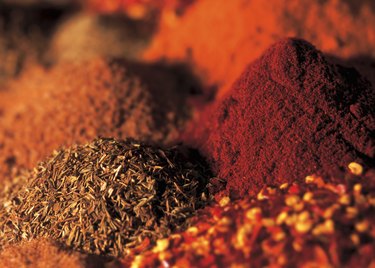
Smoked pork has a distinct smoky flavor with savory, spicy and sweet notes. These flavors are achieved with spice rubs, sauces and barbecuing over wood chips. To achieve these same flavors in recipes without using smoked pork, create a spice blend by adding smoked and savory spices, spices with moderate heat and a small amount of brown sugar to round out the flavors. Spice blends can add smoky flavor without heat to potatoes, fish, chicken, beans, soups and leafy green dishes.
Smoked Spices
Video of the Day
To achieve smoky flavors in recipes, use spices that have a natural smoky essence such as cumin, or spices that are smoked before grinding such as smoked paprika and smoked salt. Cumin has a distinct bitter taste and a warm aroma and is often used in barbecue sauces and rubs for its complex flavor. Due to its pungent essence, only use a small amount. Smoked paprika heightens the smokiness in barbecued pork dishes. Its characteristic scent is similar to mesquite firing. Add a pinch at a time to dishes until you have achieved the desired flavor. Smoked salt lends a subtle smokiness to dishes when used as a finishing salt. Avoid adding full teaspoons of smoked salt to recipes, as over salting may result.
Video of the Day
Spices with Heat
Chipotle chilies have an intense smoky flavor and a moderate heat. Often, they are ground up and used in barbecue sauces and rubs to add exotic heat to pork. Chipotles are smoke-dried jalapenos that supply a kick to a spice blend or sauce. Add only a pinch at a time, until you have achieved the desired heat. Cayenne pepper adds slight flavor and intense spice. Only a small amount is required to add substantial heat. Black pepper heightens flavors and supplies moderate heat.
Savory Seasoning
Savory seasonings such as garlic and onion powder highlight smoky flavor and supply boldness without taking over the dish. Garlic and onions are dehydrated and then ground to create powders. Check the ingredient list on the bottle for added fillers, which require that you need to use more spice. Most spice rubs incorporate a small amount each of garlic and onion powder.
Brown Sugar
Smoked-pork encompasses a slight sweetness. Often, brown sugar is added to salt brine, which helps to tenderize pork prior to smoking. Brown sugar is also added to the spice rub, which helps to caramelize the meat and mellow spicy flavors. With brown sugar, you don't want to add too much, so consider the dish. A small to moderate amount of brown sugar is added to brine and spice rubs; however, when substituting seasonings for smoked pork, consider the dish. Dishes that incorporate ingredients such as sweet potatoes or beans may benefit from added sugar, while dishes that incorporate bitter greens and white potatoes may not.
Tips
Ground spices remain freshest in airtight containers free from heat and light. However, they will only retain their characteristic scents and flavors for approximately six months, as the essential oils in spices tend to evaporate quickly. Measure spices by hand or into a bowl to avoid pouring too much into a dish. As well, keep the bottles away from steamy heat on the stove, which may cause clumping in the jar.